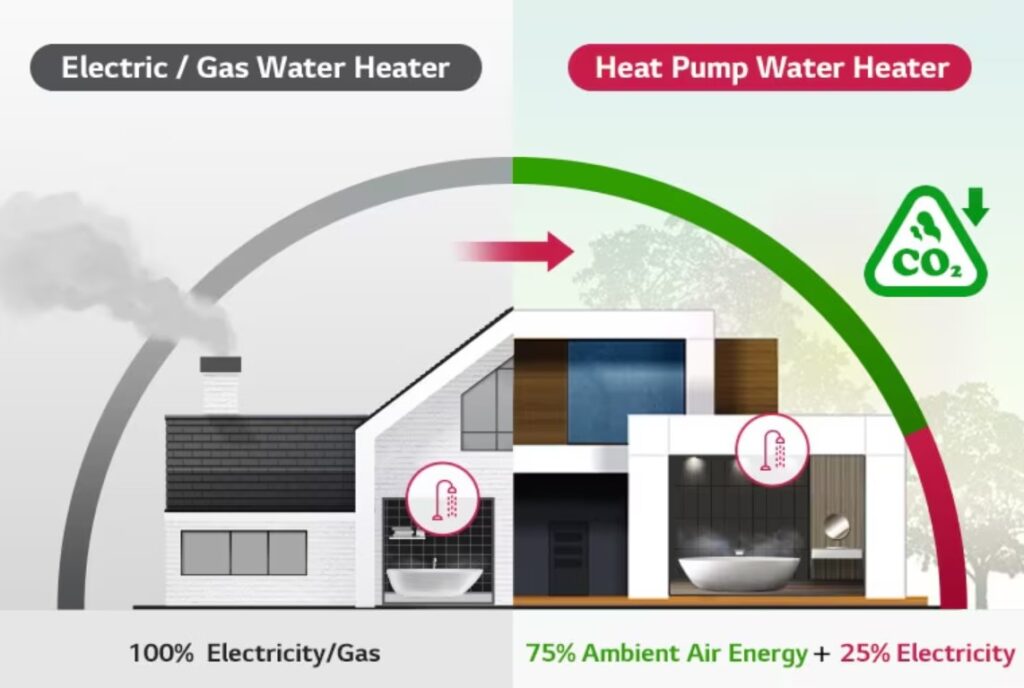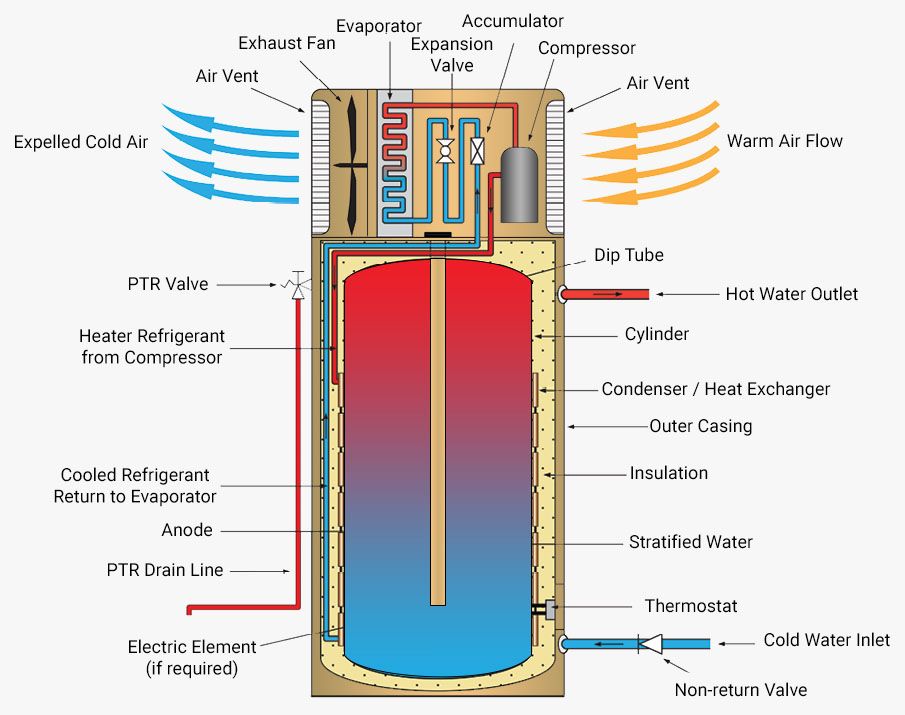How Does a Heat Pump Compare to a Gas Hot Water System?
Key Takeaways

Image source: https://www.lg.com/global/business/hvac/residential-solutions/water-heater
A heat pump uses surrounding air to extract heat and transfer it into the water tank. This process makes it highly energy-efficient. On the other hand, a gas hot water system burns natural gas or fossil fuels to heat the water tank. While this method is effective, it’s less efficient than a heat pump, especially in cold climates.
Which Is Better for Cold Climates: Heat Pump or Gas Hot Water?
Heat pumps tend to lose efficiency in winter months as the air temperature drops. However, a gas hot water system doesn’t depend on surrounding air temperature, making it a better choice in cold climates. Still, a gas boosted solar hot water system could be a middle ground, using solar panels to assist the gas system.
Why Choose a Heat Pump Over Gas Hot Water?
Choosing efficient hot water systems like a heat pump over a gas hot water system can save you money on energy bills in the long run. Heat pumps are environmentally friendly, with lower greenhouse gas emissions compared to gas systems. They’re also compatible with solar pv systems, further reducing your electricity usage.
Heat Pump vs Gas Hot Water: Which Is Better for Your Home?
The best choice depends on your home’s location and available resources. If you live in a cold climate or have easy access to natural gas, a gas hot water system might be more suitable. However, if you’re in a moderate climate and want to reduce your carbon footprint, a heat pump is likely the better option.
Technology and Performance
Heat Pump vs Gas Hot Water: Performance in Various Climates
Heat pumps shine in moderate climates where they can easily extract heat from the air. They are less effective in colder areas where natural gas can provide consistent heating. A gas hot water system works reliably in all temperatures, making it a more versatile option for diverse climates.
Performance of Heat Pump vs Gas Hot Water in Winter
During winter months, a heat pump may require more energy to heat water, as it relies on the surrounding air temperature. Gas water heaters maintain performance regardless of the season, making them more reliable when the temperature drops.
| Winter Performance | Heat Pump | Gas Hot Water |
|---|---|---|
| Efficiency in Cold Weather | Decreases in cold, uses more electricity | Consistent, unaffected by external temperature |
| Energy Usage | Higher in winter, impacts energy bills | Steady, predictable energy consumption |
| Climate Suitability | Best in moderate to warm climates | Suitable for all climates, especially cold |
Comparing Heat Pump and Gas Hot Water Systems for Energy Efficiency
Heat pumps are generally more energy efficient because they transfer heat rather than generate it. This means less electricity usage over time compared to an electric hot water system. Gas hot water systems are efficient but rely on fossil fuels, which leads to higher carbon dioxide emissions.
Is a Heat Pump More Efficient Than Gas Hot Water?
In most cases, yes. A hot water heat pump can be up to three times more efficient than gas systems in the right conditions. They use a significant amount less energy, making them a more cost-effective and environmentally friendly choice.
Heat Pump vs Gas Hot Water: Energy Consumption Comparison
| Energy Consumption | Heat Pump | Gas Hot Water |
|---|---|---|
| Overall Efficiency | 3-4 times more efficient than gas | Efficient but higher consumption due to fuel use |
| Electricity Usage | Lower, especially with solar pv system | None, unless paired with electric backup |
| Running Costs | Lower in the long run | Higher due to gas prices and fuel consumption |
Installation and Space Requirements
Heat Pump vs Gas Hot Water: Space and Installation Complexity
Installing a heat pump can be more complex and space-demanding, requiring a well-ventilated area for optimal performance. A gas hot water system is typically easier to install, especially if you already have a natural gas connection.
Installation Requirements for Heat Pump vs Gas Hot Water
A heat pump may require modifications to your existing water heating system. This includes installing an insulated tank and ensuring adequate airflow. On the other hand, a gas hot water system can often be integrated into your home’s existing gas line with minimal alterations.
Heat Pump vs Gas Hot Water: Installation Time and Effort
| Installation | Heat Pump | Gas Hot Water |
|---|---|---|
| Time Required | Longer due to complexity | Shorter, especially with existing gas connections |
| Effort and Complexity | High, may require professional installation | Moderate, simpler if gas line is already present |
| Space Needed | Requires more space for airflow | Compact, fits in smaller spaces |
Installation and Space Requirements
Heat Pump vs Gas Hot Water: Space and Installation Complexity
Installing a heat pump can be more complex and space-demanding, requiring a well-ventilated area for optimal performance. A gas hot water system is typically easier to install, especially if you already have a natural gas connection.
Installation Requirements for Heat Pump vs Gas Hot Water
A heat pump may require modifications to your existing water heating system. This includes installing an insulated tank and ensuring adequate airflow. On the other hand, a gas hot water system can often be integrated into your home’s existing gas line with minimal alterations.
Heat Pump vs Gas Hot Water: Installation Time and Effort
| Operational Costs | Heat Pump | Gas Hot Water |
|---|---|---|
| Upfront Costs | Higher | Lower |
| Long-Term Savings | Greater due to efficiency | Lower due to fossil fuel dependency |
| Energy Bill Impact | Lower over time | Higher, influenced by gas prices |
Cost Considerations
Initial Costs: Heat Pump vs Gas Hot Water
The initial cost of a heat pump is generally higher than that of a gas hot water system or electric hot water systems. However, the state government offers rebates for energy efficient systems like heat pumps, which can offset some of the upfront expenses.
Heat Pump vs Gas Hot Water: Long-Term Cost Savings
Over time, the running costs of a heat pump are lower due to its efficiency and lower electricity usage. A gas hot water system might have lower upfront costs, but gas prices can lead to higher energy bills in the long run.
Heat Pump vs Gas Hot Water: Impact on Utility Bills
With a heat pump, you can expect lower energy bills thanks to its efficient use of surrounding air to heat water. Gas systems might lead to higher bills, especially in areas where gas prices fluctuate.
Heat Pump:
Higher upfront cost
Lower running costs
Eligible for government rebates
Gas Hot Water:
Lower upfront cost
Higher running costs
Affected by gas prices
Operational Costs of Heat Pump vs Gas Hot Water System
| Installation | Heat Pump | Gas Hot Water |
|---|---|---|
| Time Required | Longer due to complexity | Shorter, especially with existing gas connections |
| Effort and Complexity | High, may require professional installation | Moderate, simpler if gas line is already present |
| Space Needed | Requires more space for airflow | Compact, fits in smaller spaces |
Heat Pump vs Gas Hot Water: Which Offers Better ROI?
Heat pumps offer a better ROI over time, especially in moderate climates where they operate efficiently. Gas systems might have quicker payback periods, but ongoing fuel costs reduce their overall ROI.
Heat Pump vs Gas Hot Water: Suitability for Large Homes
For larger homes with higher water heating demands, a gas hot water system may be more reliable. However, a heat pump can still be effective if paired with an insulated tank and a solar pv system to boost efficiency. Additionally, solar hot water systems can provide significant savings on running costs and may qualify for potential government rebates.
Maintenance and Lifespan
Maintenance Needs: Heat Pump vs Gas Hot Water
Heat pumps generally require regular maintenance, such as checking the insulated tank and ensuring the system is free of debris. Gas hot water systems need less frequent maintenance but still require occasional inspections of the gas line and burners.
Heat Pump vs Gas Hot Water: Which System Has Lower Maintenance Costs?
While gas systems typically have lower maintenance costs, heat pumps may offer better value over their longer average lifespan. Regular maintenance is crucial to keep both systems running efficiently.
Lifespan Comparison: Heat Pump vs Gas Hot Water Systems
Heat pumps have a longer average lifespan than gas hot water systems. With proper care, a heat pump can last up to 15 years or more, whereas gas systems might last around 10-12 years.
Heat Pump vs Gas Hot Water: Safety and Reliability
Heat pumps are generally safe, with few risks if installed correctly. However, gas hot water systems carry the risk of gas leaks and carbon dioxide emissions, which can be dangerous if not properly managed.
Heat Pump:
Longer average lifespan
Regular maintenance needed
Safer with lower risk of leaks
Gas Hot Water:
Shorter lifespan
Less frequent maintenance
Higher risk of leaks and emissions
Environmental and Safety Impact
Environmental Impact: Heat Pump vs Gas Hot Water
Heat pumps are more environmentally friendly because they use air to transfer heat instead of burning fossil fuels. This results in lower greenhouse gas emissions. Gas hot water systems, on the other hand, contribute to carbon dioxide emissions, increasing their carbon footprint.
Is a Heat Pump More Eco-Friendly Than a Gas Hot Water System?
Yes, heat pumps are generally more eco-friendly. They use renewable energy sources like air and can be paired with a solar system to power heat pumps for hot water, further reducing electricity usage. Gas systems rely on non-renewable resources, making them less sustainable in the long run.
Heat Pump vs Gas Hot Water: Impact on Carbon Emissions

| Carbon Emissions | Heat Pump | Gas Hot Water |
|---|---|---|
| Greenhouse Gas Emissions | Lower | Higher, due to fossil fuel usage |
| Carbon Footprint | Smaller | Larger, especially without solar integration |
| Environmental Benefits | Significant | Limited |
Heat Pump vs Gas Hot Water: Sustainability Comparison
Heat pumps offer greater sustainability due to their use of renewable energy and lower carbon footprint. Gas systems are less sustainable due to their reliance on fossil fuels and non-renewable resources.
Safety Concerns: Heat Pump vs Gas Hot Water
Heat pumps are generally safe but require proper installation and maintenance. Gas hot water systems pose risks like gas leaks and carbon monoxide poisoning. Installing CO detectors and maintaining the gas line are crucial for safety.
Final Considerations
Pros and Cons of Heat Pump vs Gas Hot Water
Heat Pump:
Pros: Energy-efficient, environmentally friendly, lower running costs
Cons: Higher initial cost, reduced efficiency in cold climates
Gas Hot Water:
Pros: Reliable in all climates, lower upfront cost, quicker installation
Cons: Higher greenhouse gas emissions, higher running costs
Cost Analysis: Heat Pump vs Gas Hot Water
A heat pump is an investment in energy efficiency and long-term savings. While the initial cost is higher, the lower running costs and government rebates can make it a more economical choice over time. Gas hot water systems might be cheaper upfront but lead to higher energy bills due to fuel consumption.
Which System Is Better: Heat Pump or Gas Hot Water?
Choosing between a heat pump and a gas hot water system depends on your home’s needs, climate, and budget. For an energy-efficient and environmentally friendly solution, a heat pump is often the best choice. If you need reliability in cold weather and lower upfront costs, a gas hot water system may be the way to go.
Make the choice that fits your home and lifestyle best. If in doubt, consult a local expert to find the right system for you.





